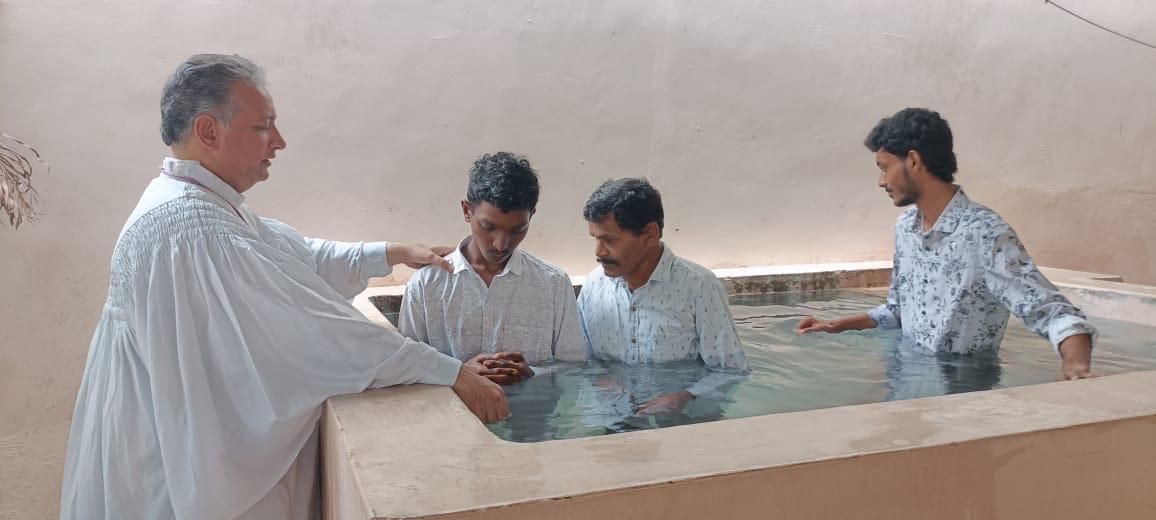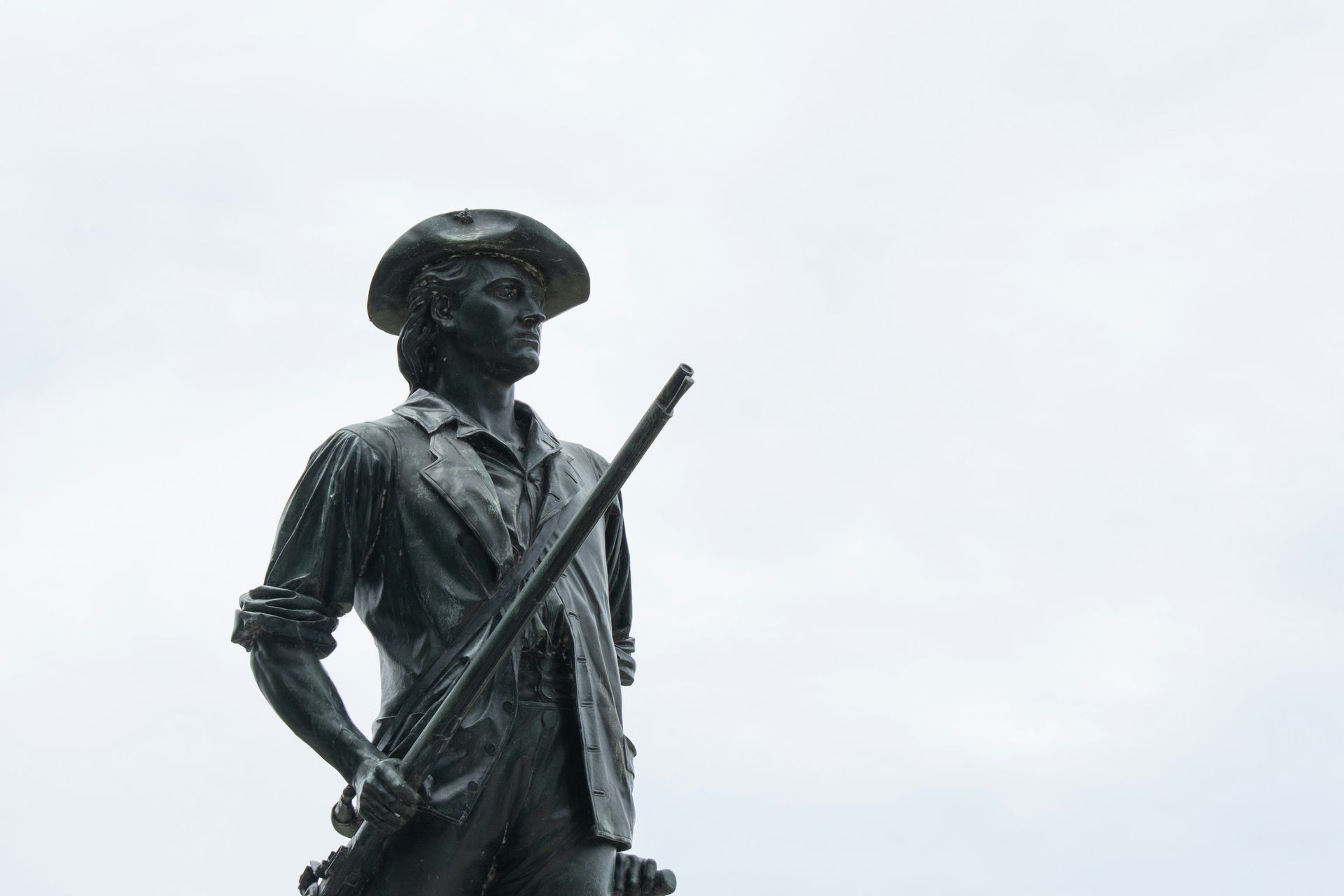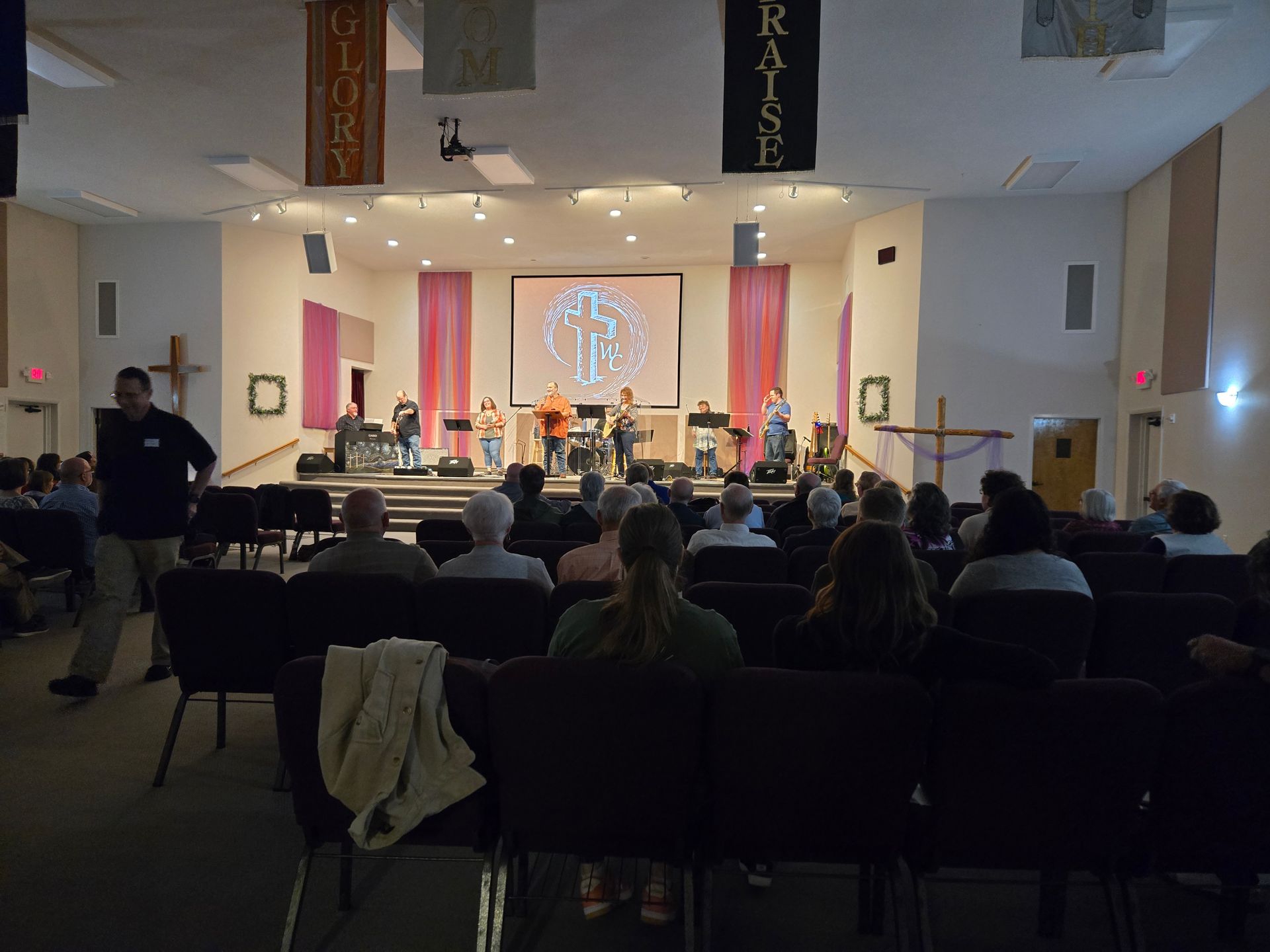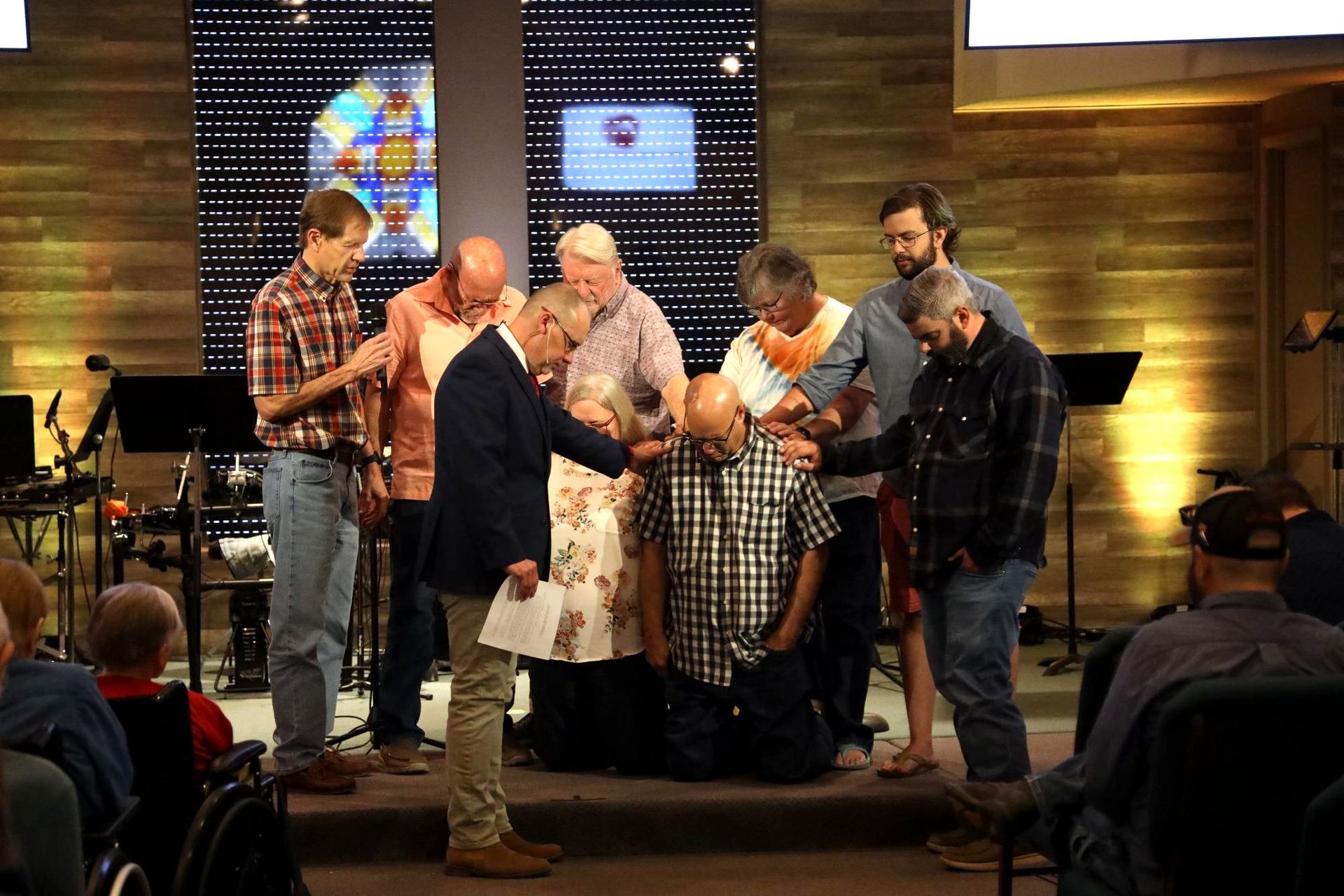With the Wind
This past Sunday was Pentecost Sunday, where we celebrate what happened to Jesus’ followers in Acts 2:1-4:
Now when the day of Pentecost had come, they were all together in one place. Suddenly a sound like a violent wind blowing came from heaven and filled the entire house where they were sitting. And tongues spreading out like a fire appeared to them and came to rest on each one of them. All of them were filled with the Holy Spirit, and they began to speak in other languages as the Spirit enabled them.
I grew up in a Pentecostal church, where this passage was given high priority. I grew up having encounters with the Holy Spirit that are hard to explain. But before we dismiss the Pentecostal church as the crazy cousins of the Christian community, I would like to give you a word of caution. The Pentecostal church, which is the most recent church in history (starting just a little over 100 years ago), is already the second-largest church in the world. The only church bigger than the Pentecostal church is the Roman Catholic Church, which just so happens to be the oldest church in history. This demonstrates that God must be at work in the Pentecostal church. Thus, we cannot dismiss that God must be at work because it does not quite compute with our rationalistic minds.
However, I am not writing to convert you to Pentecostalism. I am writing to discuss the Holy Spirit. I want to start with a definition. I teach theology at Malone University in Canton, OH. There, I define the Holy Spirit as the “personal presence of God that is active in the Church and in the world.” In other words, if there is ever a moment where we say God performed some certain action, Jesus did something, or the Father did this or that, etc., then we are actually noticing the work of the Holy Spirit. The Holy Spirit is how God acts in the world.
Jesus tells us in the Gospel of John that it is better for his disciples if he were to leave the earth because then the Holy Spirit will come. Jesus, who is fully divine, is also fully human, which means that due to his physical limitations, he can only be in one place at one time. At the time of Jesus, God was considered to be only in one place: the temple in Jerusalem. Now that Jesus has died, rose from the dead, and ascended into heaven, the Holy Spirit could come. This is the description of Acts 2; because of this, the Holy Spirit is now available at all times to all people. We do not need to wait for a certain man to enter our homes or church buildings. We do not need to make special pilgrimages to a certain building in a certain city. We have the presence of God at all times and in all places because of the Holy Spirit. This is why Jesus says it would be better for him to leave.
If this is the case, we as the Church need to talk about what it means to always have God’s presence with us. Specifically, I would like to focus on what it means to be Spirit-led, which I would argue is more a defining feature of being Pentecostal than speaking in tongues. Look at what John 3:1-8 says:
Now a certain man, a Pharisee named Nicodemus, who was a member of the Jewish ruling council, came to Jesus at night and said to him, “Rabbi, we know that you are a teacher who has come from God. No one could perform the miraculous signs you do unless God is with him.” Jesus replied, “I tell you the solemn truth, unless a person is born from above, he cannot see the kingdom of God.” Nicodemus said to him, “How can a man be born when he is old? He cannot enter his mother’s womb and be born a second time, can he?”
Jesus answered, “I tell you the solemn truth, unless a person is born of water and spirit, he cannot enter the kingdom of God. What is born of the flesh is flesh, and what is born of the Spirit is spirit. Do not be amazed that I said to you, ‘You must all be born from above.’ The wind blows wherever it will, and you hear the sound it makes, but do not know where it comes from and where it is going. So it is with everyone who is born of the Spirit.”
This is a well-known passage in the Evangelical church and is where we get the term “born-again” Christian. Yet, that seems to be the misunderstanding that Nicodemus makes. The Greek word "anothen" can be translated as again or above. This explains Nicodemus’ confusion and why he asks whether or not someone can be born a second time. He even gives quite the picture by imagining a grown person climbing back into the mother’s womb only to come out again.
However, by Jesus’ response, we can tell he doesn’t mean a second physical birth. Instead, he is talking about a different kind of birth, a birth that cannot come from this earth but a birth that can only come from “above.” "Above" would have been associated with heaven. And simply put, heaven is God’s place. It is where he dwells and, most importantly, where he reigns. This is why Jesus connects this birth from above to the “kingdom of God.” In order to enter the reign and rule of God, you must undergo a new creation act generated from the place where God reigns and rules now. The question we should have after such a statement is the one that Nicodemus has: how does this work? Jesus says that it works through the Spirit.
This new creation act does not originate the way we were initially created; instead, it originates through the Spirit. In other words, the birth from “above” is a supernatural transformation. This means that all people who have had the new birth experience have been born of the Spirit. If the Spirit is the one that births us, then the Spirit will also lead us as we live this new creation life. You are only born to live, not just to be born. The metaphor of a new birth includes a new life. All people who claim to be disciples of Jesus have been born of the Spirit and now live a life that is led by the Spirit. The image Jesus gives for the Spirit-led life is the wind blowing. There is a mystery to the wind; we don’t know where it comes from or where it is going, but we do hear the sound of it coming. Jesus uses this metaphor, and sometime later in Acts 2, the description of the Holy Spirit coming upon people is described as the sound of the rushing wind.
The word for Spirit and wind both come from the Greek word pneuma. Jesus is definitely using a play on words here by using both meanings of pneuma interchangeably. Pneuma can also mean breath. These word associations of spirit, breath, and wind should bring to mind creation. In Genesis 2, we are told that God breathed into the first humans. It also makes sense that creation is at play here because of John 1. There, the writer of the Fourth Gospel calls to mind Genesis 1, when he describes the world as being created through the Logos who is Jesus. We shouldn’t be surprised, then, that John records a unique conversation between Jesus and Nicodemus that concerns new creation.
This new creation will now allow humanity to be who they were always meant to be: the co-rulers of God with the world. Hint: why does Jesus talk about entering the kingdom of God here? The new birth is tied to the kingdom of God because it allows humans to properly reflect the rule of God back to the world like they were supposed to. This is possible for humans because of the work that the Spirit plays in the new birth and the new life that is to follow. The disciple of Christ is not just reborn through the Spirit but also led by the Spirit. The disciple of Christ is not one who is firmly rooted in the past nor one who is caught up in the grand designs of the future. Rather, the disciple of Christ is captive to the present moment, waiting to hear the sound of the wind coming.
However, we do not like living this way. Why? Because it takes submission. We can’t master the Spirit, because the Spirit is God. So when we feel and hear the wind blowing, we begin to hang on because we are worried that we might get blown to a place that we would never choose. And when the Spirit blows, what is it that we hang on to the most to try to stop the wind from blowing? We usually default to our rationalism and we express that through clinging to the Bible.
There is a place to be word-led, in fact, we should be. As Brethren, we talk about the Outer Word (referring to Scripture) and the Inner Word (referring to the Spirit) pointing us toward the Living Word (Jesus). We hold word and Spirit in balance so that we can truly see Jesus. Yet, it seems in the church, we always default to the word over the Spirit. Why? Well, because the word is in black and white. We can do the linguistic hurdles necessary to get the word to say whatever it is we want it to say. We can use the word like a law book whereby we judge people, events, and even ideas by it. However, the word only ever has true power when we invite the Spirit into conversation with it. Why do we not do this? Well, there is a difference between the word and the Spirit: the Spirit is God and the word is not.
Being in the presence of God freaks us out, and if we invite the Spirit into the conversation, then we will be in God’s presence. Then we will have no choice but to submit. We would rather leave the Spirit out because being in the presence of God will remind us of who we truly are: the co-rulers and not the rulers. Inviting the Spirit into the conversation is to remind us that we are not the people who have the ultimate authority. It will even be a reminder that the word doesn’t have ultimate authority; rather, the Spirit does. The Spirit itself is the one that gives the word authority. However, we don’t want that. We would rather be able to control the word, we would rather be the god, and so we default to the word because we can control it. We can’t control the wind, but I can flip to whatever section of the book I want. If I choose, I can even close it.
The word gets abused all the time. It is easy to abuse because it can be relegated to just another text on the page. As believers, we believe that it is more than that because every faith statement regarding Scripture says that it gets its power through the Holy Spirit. Without the Spirit, the word is just text on a page that can be abused, manipulated, and even marketed. It is why today you can shop online for such a thing as a God Bless the USA Bible. It includes not only the King James translation of Scripture but also a copy of the chorus “God Bless the USA” written by Lee Greenwood, The US Constitution, The Bill of Rights, The Declaration of Independence, and the Pledge of Allegiance. On the website for the God Bless the USA Bible, under the frequently asked question: “What makes this Bible unique and special?” The answer follows: “First and foremost, The God Bless The USA Bible is the ONLY Bible inspired by America’s most recognized patriotic anthem, God Bless The USA.” Right there in black and white on this Bible’s website, they are replacing the Spirit with a “patriotic” song. Why? Probably because after reading Scripture, it is much more comfortable to read the Constitution than to be convicted by the Holy Spirit.
However, the Spirit can also be abused. This is a tale as old as time. You can look all throughout church history and see time and time again, where charismatic leaders would come, claiming to be inspired by the Spirit and then go off the rails. This is part of the church’s hesitancy to embrace the Pentecostal movement because it is seen to be in line with all of the spiritual abuses of the past. And if you look at the history of Pentecostalism, you will see that the abuses of the past still come up in the present, and unfortunately, it is safe to assume that those abuses will continue to happen in the future as well. However, the answer to abuses of the Spirit is not cessation. It is not denying, stopping, or exiling the Spirit, rather, it is discernment. It is learning how to listen so that you know whether or not it is the wind that is blowing. The answer is to not stop the work of God or, even worse, replace him with the word that God produced; rather, it is to learn how to listen to God better.
So, how are we spirit-led? How do we ensure that we emphasize the proper Word-Spirit dynamic? I have three suggestions, all of which have already been mentioned.
First and foremost, we need to have complete and total submission to the Holy Spirit. We cannot be blown by the wind if we are not willing to let go. We need to give up control. We need to fight the human impulse to lead ourselves. I am not saying that when you give up control the Spirit is going to tell you to quit your job and move to another country. I mean the Spirit could do that, but I have my doubts. I think your life will be changed in much more subtler ways. After all, Elijah encountered God through the still, small voice. This will make more sense in a moment, but for now, we need to have the willingness to completely and totally submit because the Spirit is God.
Second, being Spirit-led places importance on being in community. How do we discern that it is the wind blowing? Through community. The Brethren call this practice communal discernment. It can be painstakingly slow at times, but when the discernment process is finally over, it will be a moment of beauty. We know that the Spirit is not being abused when we are willing to submit together. If those who are coming together are Spirit-led people, then we can trust that the Spirit will lead through the voice of the community. This is how the church historically has led. We will get it wrong sometimes, and that is okay; we do not need to live in fear over making the wrong decision. Yet if we are truly following the Spirit, we will discover the error of our ways sooner rather than later. Most importantly, communal discernment means we cannot silence anyone but that everyone must have a voice at the table.
Last, the Spirit-led life is attuned to the present moment. This is exactly what the wind metaphor means by not knowing where you come from or where you are going. The Spirit-led person doesn’t believe the lies of nostalgia concerning the glory days, and it doesn’t believe the lies of the utopian future either. Instead, the Spirit-led person recognizes where God is at work in the present moment and comes alongside God to help accomplish that work. The Spirit-led person recognizes that the present moment is both the yesterday that we remember fondly and the future moment we have anxiously been waiting for.
When I think about the Spirit-led life and Jesus’ metaphor of the wind blowing, I can’t help but think of the movie Forrest Gump. If you have never seen the movie, Forrest Gump is a fictional story of a man with a mental disability who has a profound impact on American life throughout the 1960s, 70s, and 80s. He becomes a college football All-American, a Vietnam war hero, a world-champion Ping Pong player, the owner of a million-dollar shrimp company, one of the first investors in Apple computers, and my personal favorite, the person who called the cops about the break-in at the Watergate hotel.
The thing about Forrest is that he did not plan to do any of these grand accomplishments. In fact, because of his mental disability, the significance of the moment is typically lost on Forrest. He does not understand that what he is doing is necessarily spectacular and the reason is because he is just doing what the moment calls for. To press this illustration further, Forrest’s life is symbolized by a feather being blown in the wind. The opening scene of the movie is of a feather falling from the sky and landing on Forrest’s shoe. The movie ends with Forrest waiting with his young son for the school bus. While waiting, they open a book where the same feather has been placed in. The wind then blows the feather away, and it leaves the viewer asking the question: Where will the wind blow Forrest next?
That is an example of the Spirit-led life. It is doing whatever the moment requires. It is being able to hear the wind blow so that you know that it is coming. When it does, you don’t hang on to whatever anchor you can find, nor do you point yourself in a particular direction to ensure the most comfortable landing spot, but you let go and submit to wherever the wind may blow. The best news is that you don’t have to do this on your own because the Spirit that is leading you will also be the one empowering you, and that is why the Holy Spirit came 2,000 years ago. Happy Pentecost Church!
Drew Meziere
North Central Regional Resource Coordinator (RRC)











